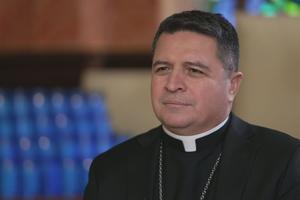Catholic Teaching and the Border: It Is Not What Some May Think
COMMENTARY: The Church acknowledges and supports the right of nations to manage their borders, but offers an alternative vision to accomplish this goal, consistent with human dignity.

Some observers, including Catholics, who follow the national immigration debate believe that the Catholic Church, led by the U.S. bishops, has little interest in reducing the number of migrants arriving at the southern border with Mexico.
Of course, nothing could be farther from the truth. Catholic social teaching over time has been consistently clear that a sovereign nation has a right to manage and control its borders. Several popes have articulated this portion of the teaching on immigration, including Pope Francis, who called the situation at the Mexican border “a serious problem.”
The caveat, however, is how a nation manages migration to its borders, not if it does, and therein lies the rub. As appropriate, the Church places the human rights and human dignity of the person — created in the image of God — as the primary concern for governments, a position that often places Church leaders and advocates on the opposite side of some immigration opponents.
Pope Benedict XVI, in his 2010 message for World Day of Migrants and Refugees, succinctly articulates the Church’s position:
“The Church recognizes the right [to emigrate] in every human person...At the same time, States have the right to regulate migration flows and defend their own frontiers, always guaranteeing respect due to the dignity of each and every person.”
In other words, the sovereign can place limits on migration, provided it enforces its laws as humanely as possible.
Given these parameters, the Church would naturally oppose many of the punitive measures that have been proposed to control the nation’s borders, such as unnecessary detention and expulsion without due process, both of which can violate human dignity. The Church has not opposed, however, the right of a nation to remove an individual who, properly adjudicated, is not legally authorized to be present in a country, provided it is done consistent with human dignity and human rights.
How can a government appropriately balance the protection of human rights and dignity with its right to maintain its sovereignty? Pope Benedict, again in his 2010 statement, frames this question:
“The challenge is to combine the welcome due to every human being, especially when in need, with a reckoning of what is necessary for both the local inhabitants and the new arrivals to live a dignified and peaceful life.”
In policy terms, the Church has articulated several public positions that answer Pope Benedict's challenge — policies that protect human rights and dignity but also help manage our border. Acknowledging the right not to migrate, for example, the Church has consistently made the argument that conditions in sending countries should be improved to allow migrants to remain and support their families in dignity. The U.S. Conference of Catholic Bishops (USCCB), for example, has outlined several steps that can be taken to address the root causes of migration. Although a long-term process, addressing root causes, in the Church’s view, is the ultimate durable solution to irregular migration.
In her advocacy over the years, the Church also has emphasized the need for legal avenues to allow migrants to enter the country and work lawfully and for families to be reunited. Irregular migration is not good for the migrant or the sovereign, as it creates human costs for the migrants and financial and moral costs for nations trying to control it.
The U.S. immigration system, which has not been reformed in nearly 40 years, is devoid of the necessary number of legal channels for both low- and high-skilled immigrants to enter the U.S. and work legally. This is particularly detrimental to the nation’s economy, as labor economists project labor shortfalls in certain industries for years to come. Studies have shown that increased legal avenues can help reduce irregular migration to a country.
While strongly supportive of the right to asylum, the Church is also not opposed to the reform of the U.S. asylum system, which is severely backlogged and has led to multi-year wait times for those who qualify for an asylum hearing. Shortening wait times for hearings and making legal representation more accessible to asylum-seekers would expedite the asylum process without violating due process. Under these circumstances, the Church would support the use of community-based alternatives to detention programs, which have proved to help asylum-seekers prepare their cases and ensure that they appear at their hearings.
Significantly, the Church not only has articulated what should be done to manage the border, but has played a role in helping the government get it done. Despite assertions from certain public officials that they facilitate irregular migration, Church programs on the border are operated in cooperation with federal authorities and fill a service gap that cannot be done by the government. If Catholic service programs did not provide assistance, including temporary housing, to recently arrived asylum-seekers already processed by the Border Patrol, for example, the situation at the border, and in border communities, could indeed be chaotic.
In addition, the Church operates programs in sending countries targeted to prevent migrants from leaving their countries, including working with youth to develop livelihoods. As an example, Catholic Relief Services (CRS), the overseas relief arm of the U.S. bishops, operates programs to assist poor and vulnerable families throughout Latin America.
The Church acknowledges and supports the right of nations to manage their borders, but offers an alternative vision to accomplish this goal, consistent with Catholic teaching. To manage our border more efficiently, securely and humanely, just enforcement must be combined with broader reform of a severely broken U.S. immigration system.
Kevin Appleby is senior fellow for policy at the Center for Migration Studies of New York and the former director of migration policy for the U.S. Conference of Catholic Bishops.
- Keywords:
- catholic teaching on immigration













